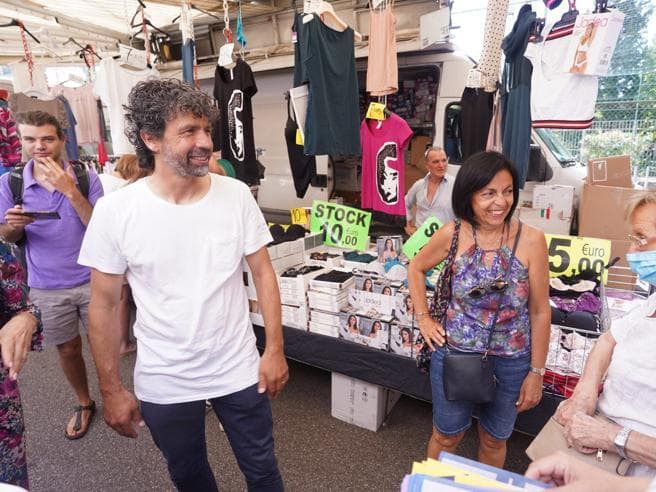ROME – Basically speaking, there are two great religious faiths in Italy, each surrounded by an imposing body of dogma, law, liturgy, and deep personal devotion: Catholicism and calcio, the Italian word for soccer. It was probably inevitable, therefore, that, sooner or later, somebody would make a political career out of combining them.
The success of Damiano Tommasi, the surprise first place finisher in Sunday’s mayoral contest in the city of Verona, is, in a certain sense, also a political parable for our times, with potential significance well beyond the boundaries of Italy.
Tomassi, now 48, is probably best known as a former midfielder for the Roma soccer club the last time it won the national championship, which is now more than 22 years ago. He also played for his hometown club, Verona, and for the Italian national team, with his last appearance coming in the 2002 World Cup in South Korea.
(I should add that I was in Rome for that championship season, and I remember Tommasi quite well. He wasn’t the flashiest player on the field, but he always did his job, and I recall the coach at the time, Fabio Capello, describing him as the glue that held the team together.)
During his career, Tomassi was nicknamed “altar boy” because of his deep Catholic faith and his reputation for honesty and integrity. Later, when his former teammates needed to find someone to head the players’ union, the only figure these notoriously alpha males could agree upon was Tomassi.
In 1993, Tomassi became the first professional soccer player in Italian history to exercise his right to conscientious objection to compulsory military service, working for Catholic organizations instead. He became an admirer of the legendary Don Lorenzo Milani, Italy’s most famous “peace priest,” and several planks of his platform in the mayoral race open with a citation of Milani.
During World War II, the young Milani had embraced Catholicism, become a priest, and started establishing his signature scuole popolari, or “popular schools,” educating both secular and believing families and forming them in the church’s social teaching. Later, Tommasi and his wife would establish their own school in Italian and English, named, appropriately, the “Don Milani Bilingual School.”
Tommasi and his wife, Chiara Pigozzo, who met when they were both 15, now have six children ranging in age from 24 to 7.
As a candidate for mayor in Verona, made famous by Shakespeare’s “Romeo and Juliet” and today a mid-sized city of roughly 260,000, Tommasi ran on a clearly leftist platform – one key promise, for instance, is a free nursery school in every neighborhood – and he was supported by the country’s left-leaning factions, but he insisted on not having any partisan affiliation and declined invitations to appear at rallies with nationally prominent liberal politicians. In fact, Tommasi spurned campaign rallies altogether, saying he preferred to speak to people face-to-face.
In all probability, it wasn’t Tommasi’s pedigree with social justice Catholicism or his ideological orientation that propelled him to claim roughly 40 percent of the vote, which was good enough for first place but not enough to avoid a run-off with a center-right challenger. Verona traditionally is a conservative city that’s been governed by a center-right mayor since 2007.
The other two leading candidates were both center-right figures, and it’s entirely possible that in the run-off, when the conservative vote presumably consolidates behind Federico Sboarina, Tommasi will be left out in the cold.
Still, it’s likely that Tommasi’s clean-hands reputation and the impression that he won’t rob the city blind will make him a formidable candidate, since Italians are long accustomed to seeing politicians line their own pockets and those of their friends without necessarily doing much for the common good.
Here’s what makes the Tommasi story a political parable of general interest.
When Tomassi declined military service, he was given the option of working instead for the Catholic charity Caritas. In turn, Caritas sent him to Telepace, a private Catholic TV network that’s more or less the EWTN of Italy, and which is based in Verona. There he became the personal driver and factotum of Father Guido Todeschini, sort of the Mother Angelica of the network, meaning its most prominent personality, and hardly what anyone would call a liberal.
Yet when Tommasi announced his candidacy for mayor, here’s what Todeschini, now 86, had to say: “Damiano is a decent young man, transparent, and committed to others. It would be a source of pride if he were to become mayor.”
In effect, Todeschini’s comment amounted to an endorsement, and therein lies the parable.
What Tommasi’s situation suggests is that even in a heavily polarized, ideologically divided time – and, make no mistake, partisan divisions are almost as toxic in Italy as they are in the U.S. or anywhere else – personal decency, kindness, and integrity can still transcend those fault lines and bring people together.
In this instance, it’s especially inspiring that those personal qualities apparently are rooted in a sincere Catholic faith – which, since the very word “catholic” means “universal,” is somehow fitting.
It’s not clear yet what the political destiny of Damiano Tommasi may be. For today, however, his surprising success seems a feel-good story … and in a deeply distressing moment for political life in many parts of the world, maybe that’s enough.













